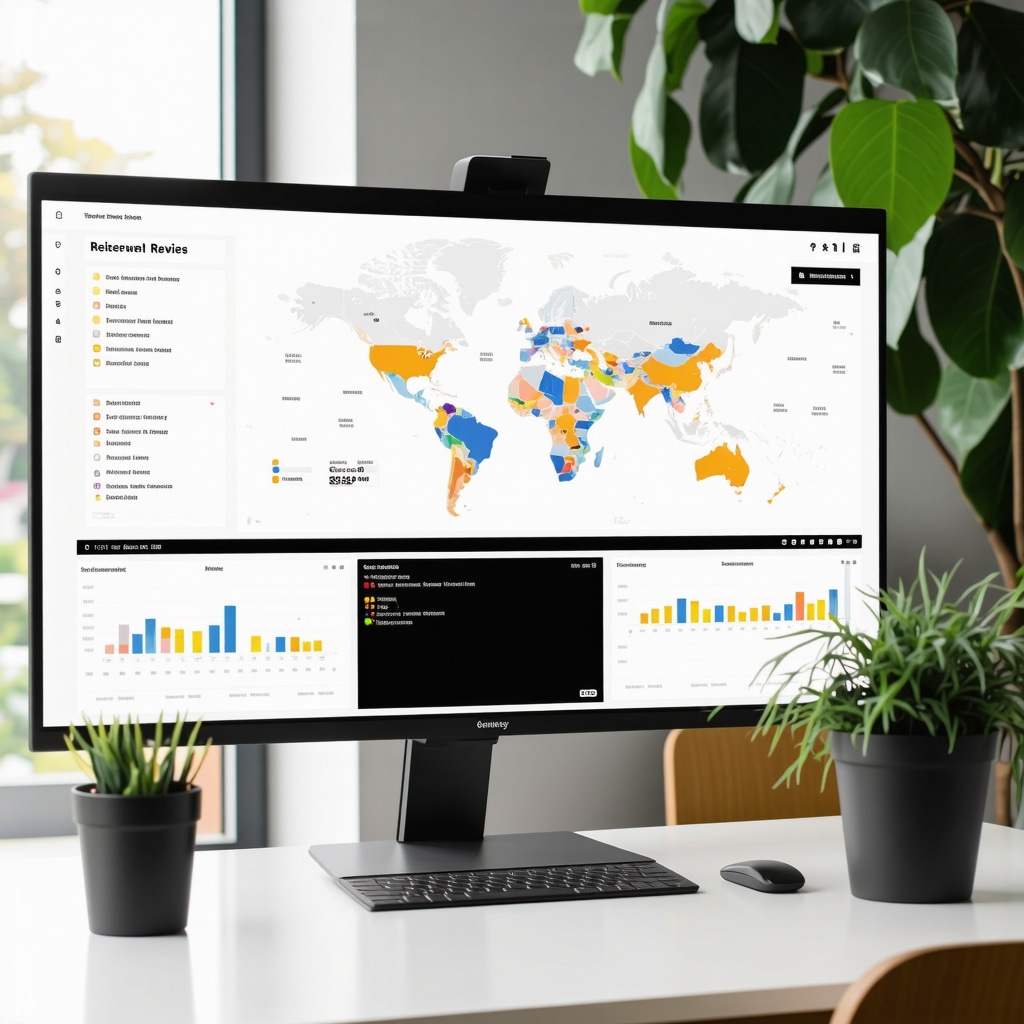Harnessing the Untapped SEO Potential of Customer Reviews
In today’s digital ecosystem, customer reviews do far more than influence purchasing decisions—they are a pivotal factor in shaping a business’s Google ranking and local search visibility. Understanding how reviews directly affect SEO can transform your approach to online reputation, turning it into a strategic asset that propels your Google Business profile to the top. This article delves into the nuanced ways reviews impact SEO, revealing expert insights and practical strategies to harness their full power.
Beyond Stars: How Review Quality and Quantity Fuel Local SEO
Google’s algorithm assesses not just the star rating but also the volume and recency of reviews, integrating these signals into local ranking factors. A steady stream of genuine, detailed reviews signals to Google that your business is actively engaged and trusted by customers, which can elevate your presence in the coveted Local 3-Pack. Moreover, rich reviews often contain relevant keywords and semantic variations related to your services or products, enhancing your Google My Business (GMB) profile’s topical relevance without artificial keyword stuffing.
What Makes a Review Impactful for SEO Beyond the Star Rating?
Experts note that reviews containing descriptive feedback, location-specific mentions, and varied vocabulary resonate more with Google’s semantic understanding. This depth helps search engines map your business to relevant local queries. Additionally, timely responses to reviews demonstrate active management, further boosting trustworthiness and user engagement metrics—both essential for SEO.
Leveraging Reviews to Amplify Trust and Engagement Signals
Search engines prioritize user experience and trustworthiness; reviews provide social proof that reduces buyer uncertainty and increases click-through rates. High-quality reviews not only improve conversion rates but also contribute to lower bounce rates and longer site visits when integrated into your Google Business profile and website. This user behavior positively influences your SEO standing, affirming your business’s relevance and reliability.
Strategic Review Management: A Proactive Approach to SEO Growth
Implementing a structured review generation and management strategy is essential. Encouraging customers to leave honest, detailed reviews and swiftly addressing negative feedback can mitigate damage and showcase your commitment to service excellence. Businesses employing consistent review solicitation techniques and actively integrating feedback reap significant gains in local search rankings, as documented in case studies by Moz and Search Engine Journal.
For comprehensive guidance on optimizing your Google Business Listing, explore this expert resource that outlines actionable strategies to enhance your profile’s SEO.
Integrating Authoritative Insights to Stay Ahead
According to Google’s own guidelines on local search ranking factors, reviews are one of the most influential signals affecting local pack rankings (Google Local Search Documentation). This authoritative endorsement underscores the critical role of reviews in SEO and validates the need for businesses to prioritize review management as part of their local SEO efforts.
Engage with your customers, invite their feedback, and watch your Google Business ranking soar—start by sharing your own success story or questions in the comments below. For tailored assistance, don’t hesitate to contact our SEO experts and unlock your business’s full potential.
Unlocking the Role of Review Velocity and Diversity in Sustained SEO Success
Beyond the sheer number and quality of reviews, the rate at which new reviews arrive—known as review velocity—is a crucial but often overlooked SEO factor. Consistent, steady inflow of reviews signals ongoing customer engagement and relevancy to Google’s algorithms, helping maintain or improve your local rankings over time. Conversely, a sudden surge followed by stagnation can appear unnatural and potentially harm your SEO efforts.
Moreover, diversity in reviews—from different geographic locations, demographics, and service categories—helps establish a comprehensive profile that aligns with a broader set of local search queries. This diversity enriches your Google Business profile’s semantic footprint, making it more adaptable to varied user intents and voice searches.
Harnessing Structured Data and Review Snippets to Amplify Search Visibility
Integrating structured data markup (Schema.org) for reviews on your website and Google Business profile can significantly enhance how reviews appear in search results. Rich snippets displaying star ratings and review counts can increase click-through rates by improving visual prominence and trustworthiness in SERPs. Proper implementation of review-related structured data complements your review management strategy and boosts your local SEO performance.
How Can Businesses Effectively Balance Review Generation Across Multiple Platforms to Maximize SEO?
While Google reviews are paramount, diversifying review collection across platforms like Yelp, Facebook, and industry-specific sites not only broadens your digital footprint but also mitigates risks if one platform’s algorithm changes. A cross-platform review strategy ensures consistent reputation signals and backlinks, which collectively enhance your domain authority and local search visibility.
Experts recommend integrating multi-channel review solicitation into your customer engagement workflows, using tailored messaging to each platform’s audience and guidelines. Monitoring and responding uniformly to reviews across these channels demonstrate your commitment to customer service, an attribute increasingly valued by search engines.
Case Study: Strategic Review Integration Driving Local Market Dominance
A recent case study by BrightLocal highlights a mid-sized service company that increased its Google Business profile views by 45% within six months through a structured review generation campaign combined with proactive reputation management. This campaign emphasized authentic, in-depth reviews and rapid response times, which directly contributed to higher local pack rankings and increased customer inquiries (BrightLocal Local Consumer Review Survey 2024).
Implementing Review Management Tools for Scalable SEO Growth
Leveraging specialized review management platforms can automate the collection, monitoring, and response process, ensuring no customer feedback goes unnoticed. These tools provide analytics to identify trends, sentiment, and areas for improvement, enabling data-driven SEO strategies that dynamically adapt to consumer behavior and algorithm updates.
For businesses seeking to scale their local SEO efforts efficiently, exploring top GMB SEO tools can be a game-changer, offering streamlined workflows and actionable insights.
Engage with this article by sharing your experiences with review management or questions about multi-platform strategies in the comments below. Consider sharing this resource with peers looking to deepen their local SEO impact or explore more in-depth strategies through our comprehensive guides.
Decoding the Nuances of Review Sentiment Analysis for SEO Optimization
While star ratings offer a quick snapshot of customer satisfaction, the underlying sentiment conveyed in review text holds deeper SEO implications. Advanced sentiment analysis leverages natural language processing (NLP) algorithms to parse reviews for positive, neutral, and negative expressions, providing insights beyond traditional metrics. Search engines increasingly utilize these nuanced signals to assess brand reputation, relevance, and trustworthiness.
Incorporating sentiment analysis into your review management strategy allows businesses to identify emerging issues or strengths promptly, enabling proactive optimization of customer experience and SEO performance. For instance, consistently positive sentiment about specific services or products can be strategically highlighted in marketing campaigns and website content to reinforce SEO relevance.
What are the best practices for integrating sentiment analysis data into local SEO strategies?
Experts advise combining quantitative sentiment scores with qualitative insights to inform content creation, keyword targeting, and service improvements. Structured reporting tools can automate this process, flagging sentiment trends and correlating them with traffic and ranking fluctuations. This approach cultivates a dynamic SEO model that responds to customer voice in real-time, enhancing both visibility and engagement.
Exploiting the Power of Review Responses: Crafting SEO-Friendly and Customer-Centric Replies
Responding to reviews is not merely a courtesy; it’s a strategic SEO maneuver that signals active engagement and responsiveness to search engines. Crafting replies that include relevant keywords naturally, address the reviewer’s concerns or praises, and maintain a professional tone can amplify the semantic signals associated with your Google Business profile.
Moreover, well-crafted responses encourage further user interaction, fostering a community around your brand and increasing the likelihood of additional reviews. This virtuous cycle strengthens your SEO footprint and builds long-term customer loyalty.
Harnessing Schema Markup Variants to Elevate Review Visibility in Rich Snippets
Beyond basic review schema, advanced implementations include AggregateRating, Review, and LocalBusiness structured data types, each contributing uniquely to search result enhancement. Applying these variants correctly can unlock rich snippet features such as star ratings, reviewer names, and review excerpts directly in SERPs.
Technical SEO specialists recommend rigorous validation of structured data using Google’s Rich Results Test to avoid penalties and ensure optimal rendering. Integrating these schemas with dynamic content feeds from your review management system creates a seamless, scalable solution for maintaining up-to-date and SEO-optimized review displays.
Multilingual and Multiregional Review Strategies: Expanding Reach and Relevance Globally
For businesses operating across borders, managing reviews in multiple languages and regions presents both challenges and opportunities. Multilingual reviews not only reflect diverse customer bases but also enhance local relevance in different linguistic markets, which Google increasingly values.
Implementing localized review solicitation and response protocols, alongside hreflang annotations and region-specific Google Business profiles, can significantly improve your international SEO standing. Additionally, leveraging machine translation tools with human oversight ensures the authenticity and accuracy of multilingual review content.
Emerging Trends: Voice Search and Reviews in the Era of Conversational AI
The rise of voice-activated search devices and conversational AI assistants introduces new dynamics in how reviews influence SEO. Voice queries tend to be longer and more conversational, often seeking recommendations and opinions that reviews richly provide.
To capitalize on this trend, businesses should optimize review content for natural language processing by encouraging customers to describe experiences in detail and using conversational keywords. Structuring FAQ sections that incorporate common voice search intents related to reviews can also boost voice search visibility.
According to a study by BrightLocal, 58% of consumers use voice search to find local businesses, underscoring the critical role reviews play in this evolving SEO landscape.
Ready to elevate your local SEO strategy by mastering these advanced review optimization techniques? Dive deeper into our expert resources and join the conversation by sharing your insights or questions below. For personalized guidance, connect with our SEO professionals who specialize in cutting-edge reputation management solutions.

Deciphering the Influence of Review Velocity Patterns on Algorithmic Trust
While consistent review acquisition is widely recommended, a deeper understanding of review velocity fluctuations can provide a competitive edge. Search engines interpret a natural, steady cadence of reviews as authentic engagement, whereas abrupt spikes followed by silence may trigger algorithmic suspicion. Advanced SEO practitioners advocate for pacing review requests to mirror organic customer interactions, thereby maintaining algorithmic trust and fostering sustainable ranking improvements.
Harnessing Review Diversity for Enhanced Semantic Footprint and Voice Search Adaptability
Expanding the demographic and geographic breadth of customer reviews enriches your business’s semantic footprint. This diversity enables your Google Business profile to align with a wider spectrum of localized and long-tail queries, including those emerging from voice search technologies. By encouraging varied customers to share context-specific experiences, businesses can optimize for multifaceted search intents, amplifying their reach across heterogeneous user profiles.
How Can Sentiment-Driven Review Insights Refine Keyword Targeting and Content Strategy?
Leveraging sentiment analysis tools to dissect the emotional undertones within customer feedback allows marketers to identify prevalent themes and pain points. This granular understanding informs the strategic integration of emotionally resonant keywords and phrases into website content and GMB descriptions. By aligning content with authentic customer sentiments, businesses can boost relevancy signals and enhance user engagement metrics, crucial factors in contemporary SEO algorithms.
Integrating Review Response Frameworks to Cultivate SEO-Optimized Customer Interactions
Crafting responses to reviews extends beyond politeness—it is an opportunity to embed strategic keywords naturally, address customer concerns, and highlight unique selling propositions. Utilizing a structured response framework that balances professionalism with personalization can increase semantic relevance and user trust simultaneously. Regular monitoring and timely replies not only elevate customer satisfaction but also signal active profile management to search engines.
Implementing Advanced Structured Data Strategies for Dynamic Review Presentation
Beyond the fundamental Schema.org review markup, deploying dynamic structured data that auto-updates with incoming reviews ensures real-time accuracy of rich snippets. This proactive approach enhances search result appearance, driving higher click-through rates and reinforcing local SEO performance. Integration with CMS and review management platforms can automate this process, reducing manual overhead while maintaining technical SEO excellence.
Exploring Multi-Regional Review Management to Bolster Global Local SEO Reach
Multinational businesses benefit immensely from tailored review strategies that consider linguistic nuances, cultural expectations, and region-specific search behaviors. Employing localized review solicitation, response protocols, and hreflang annotations ensures that reviews contribute maximally to regional search relevance and user trust. Strategic use of professional translation and localization services guarantees authenticity and preserves brand voice across markets.
Authoritative Insights from Google’s Local Search Ranking Factors
According to Google’s Local Search Documentation, review signals remain among the paramount factors influencing local pack rankings. This underscores the importance of not only accumulating reviews but managing their quality, diversity, and responsiveness to align with Google’s evolving ranking criteria. Staying informed of such authoritative guidelines is critical for maintaining a competitive local SEO advantage.
Elevate your SEO strategy by implementing these advanced review optimization techniques. Share your experiences or expert questions in the comments below, or connect with our SEO specialists for bespoke consultation tailored to your business goals.

Frequently Asked Questions (FAQ)
Why are customer reviews crucial for local SEO success?
Customer reviews serve as authentic social proof that influences search engines’ understanding of a business’s trustworthiness, relevance, and engagement. Google incorporates review quantity, quality, recency, and sentiment into its local ranking algorithms, making reviews a key factor in achieving higher visibility in local search results and the Local 3-Pack.
How does review velocity affect my Google Business profile rankings?
Review velocity refers to the frequency and consistency of new reviews over time. A steady, natural flow signals ongoing customer engagement and business activity, positively impacting ranking. Sudden spikes followed by stagnation may appear suspicious to algorithms, potentially harming SEO. Maintaining a consistent review cadence helps sustain algorithmic trust and ranking stability.
What role does review sentiment analysis play in optimizing SEO strategies?
Sentiment analysis goes beyond star ratings by evaluating the emotional tone of review text using natural language processing. This insight helps identify strengths and weaknesses from customer feedback, guiding keyword targeting, content creation, and service improvements that align with authentic customer experiences—boosting relevancy and engagement signals for SEO.
How can I effectively manage reviews across multiple platforms to enhance SEO?
While Google reviews are paramount, diversifying review acquisition across platforms such as Yelp, Facebook, and industry-specific sites broadens your digital footprint and builds domain authority. Integrate multi-channel solicitation with tailored messaging and respond promptly on all platforms to demonstrate comprehensive customer service, which search engines favor.
What are the best practices for responding to reviews to maximize SEO benefits?
Replying to reviews demonstrates active engagement and enhances semantic relevance. Craft responses that naturally incorporate relevant keywords, address specific feedback, and maintain a professional yet personable tone. Timely, thoughtful replies encourage further interactions and additional reviews, amplifying SEO impact and fostering customer loyalty.
How does structured data markup improve the visibility of reviews in search results?
Implementing Schema.org structured data for reviews on your website and Google Business profile enables rich snippets in search results, such as star ratings and review excerpts. This enhances visual appeal and credibility, increasing click-through rates. Advanced schemas like AggregateRating and LocalBusiness enrich SERP appearance further, but must be validated to avoid errors.
Can multilingual and multiregional review strategies improve global SEO performance?
Yes, managing reviews in multiple languages and regions enhances local relevance and trust across diverse markets. Employ localized review solicitation, region-specific Google Business profiles, hreflang annotations, and professional translation to preserve authenticity and maximize SEO benefits internationally.
How do voice search trends influence the importance of customer reviews for SEO?
Voice searches tend to be conversational and longer, often seeking opinions and recommendations. Detailed, natural-language reviews provide rich content that aligns well with these queries. Optimizing review content for voice search by encouraging descriptive feedback and creating FAQ sections targeting voice intents can improve visibility in voice-activated results.
What tools can help scale review management for better SEO outcomes?
Review management platforms automate solicitation, monitoring, response, and sentiment analysis, providing actionable insights and ensuring no feedback is overlooked. These tools streamline workflows, track trends, and adapt to algorithm changes, enabling scalable and data-driven SEO strategies that boost local search performance.
Trusted External Sources
- Google Local Search Documentation: Official guidelines detailing how reviews influence local pack rankings and overall SEO, offering foundational insights for effective review management.
- BrightLocal Local Consumer Review Survey: Comprehensive research on consumer behaviors and preferences regarding local reviews, underpinning strategic approaches to review solicitation and response.
- Moz Local Search Ranking Factors Study: In-depth analysis of various local SEO ranking signals, highlighting the critical role of reviews in Google My Business optimization.
- Search Engine Land: Importance of Online Reviews for SEO: Expert articles and case studies demonstrating practical impacts of reviews on SEO performance and user engagement.
- Schema.org Review Markup Documentation: Technical resource for implementing structured data to enhance review visibility and rich snippets in search engines.
Conclusion
Customer reviews have evolved from mere social proof to a multifaceted SEO powerhouse that influences local search rankings, user engagement, and brand trust. By focusing on authentic, diverse, and consistently paced review acquisition, integrating advanced sentiment analysis, and leveraging structured data markup, businesses can significantly enhance their Google Business profile’s SEO performance. Proactively managing reviews across platforms and responding thoughtfully amplifies these benefits, positioning your business for sustained local market dominance.
Embrace these expert strategies to unlock the full SEO potential of customer reviews. Share your experiences, ask questions, and explore our related expert content to stay ahead in the dynamic local SEO landscape. Start transforming your review management today and watch your local search presence thrive.



